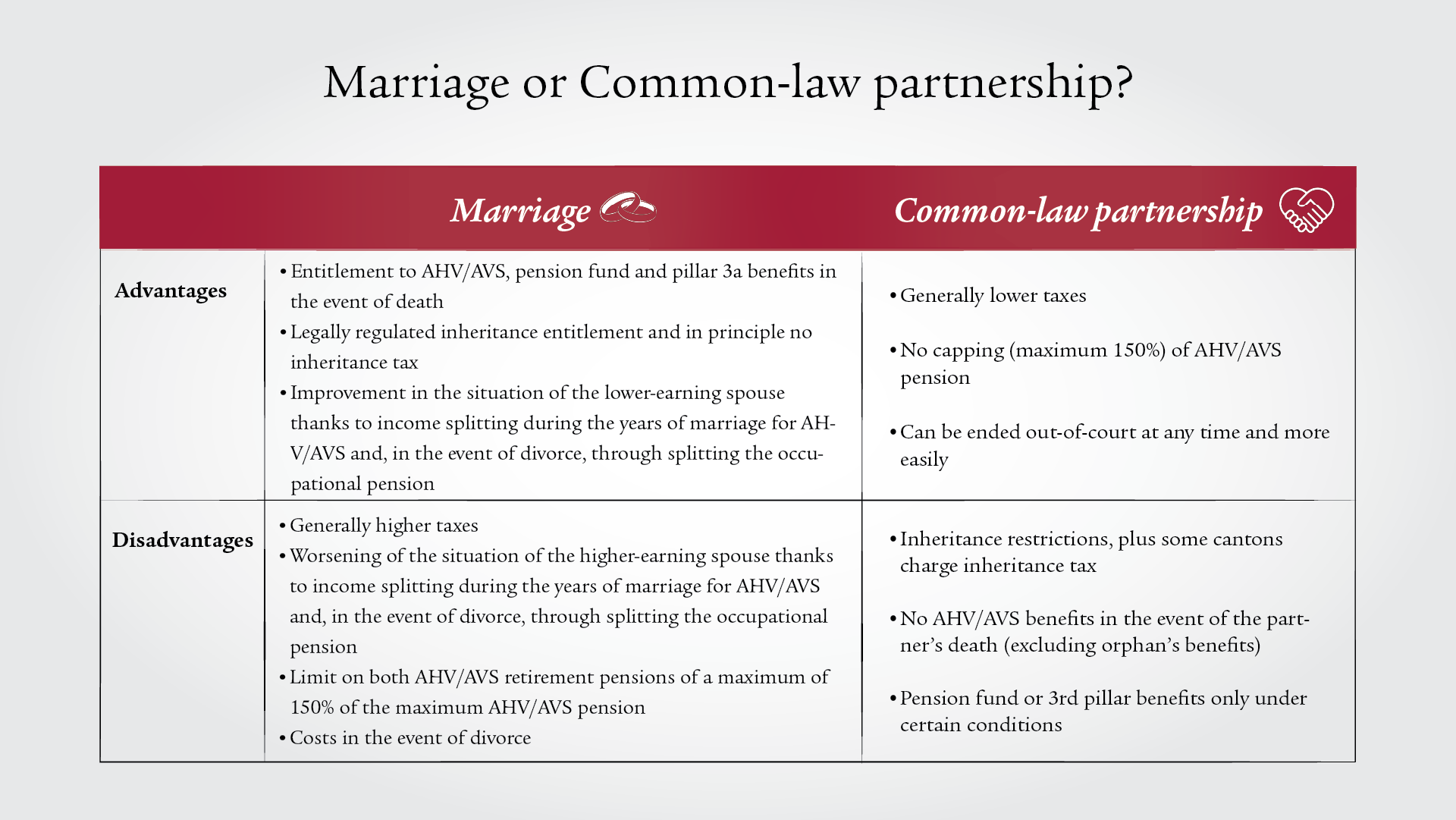Are wedding bells about to ring? Or are you thinking of popping the question soon? While preparing for a wedding may be exciting, it is also very important to consider how getting married will affect your finances and pension arrangements. Swiss Life provides a useful overview of the main advantages and disadvantages of getting married in Switzerland – for a self-determined future together.
A wedding is a significant milestone in the lives of two people. Agreeing to tie the knot involves making some changes – more than just putting a ring on your finger or changing your name. Marriage will alter many financial aspects of your life, including your pension. Married couples have better protection in the event of death, but are generally at a disadvantage compared to unmarried couples when it comes to tax and old age and survivors’ insurance (AHV/AVS) benefits.


Advantages of marriage
Death benefits
Should the worst happen, married couples are better protected. If one of the couple dies, the surviving spouse generally receives benefits via state, occupational and, if available, private pensions. Cohabiting couples are not automatically entitled to these benefits.
The surviving spouse receives survivors’ benefits from the 1st pillar (AHV/AVS) in accordance with legal requirements. A survivors’ pension or lump-sum settlement is paid out from the 2nd pillar (occupational pension). This depends on the pension fund regulations.
In the 3rd pillar, the surviving spouse also benefits financially from pillar 3a (tax-qualified provisions). In the event of death, the surviving spouse becomes the first beneficiary.
Unmarried couples are less protected in the event of death. They receive nothing from the 1st pillar, and what they receive from the 2nd pillar depends on the pension fund regulations. In the case of pillar 3a, the cohabiting partner is only a beneficiary if the common-law partnership is “qualified”. “Qualified” means that the couple has lived in a marriage-like relationship for more than five years or has a child together.

Legal inheritance entitlement and in principle no inheritance tax
In Switzerland, married couples are also at an advantage when it comes to inheritance tax. Depending on the canton, inheritance and gift taxes are considerably lower, with the surviving spouse even being exempt from inheritance tax as a rule. They also have a legal entitlement to inheritance.
Inheritance law does not provide for cohabiting couples; however, cohabiting partners may designate each other as heirs in their wills.
AHV/AVS splitting
AHV/AVS contributions are split during the marriage. This means that the income is divided during the period of marriage, with half being attributed to each spouse. While this increases the AHV/AVS pension of the person with the lower income, the person with the higher income has to accept a corresponding reduction.
There is no AHV/AVS splitting for cohabiting couples.
Pension fund splitting in the event of divorce
In the event of divorce, the marital property is divided and the pension fund is split as well: each spouse receives half of the pension fund or vested benefits accumulated during the marriage.
For the higher-earning spouse, this means a reduction in pension plan savings – but to the benefit of the lower-earning spouse.
The situation is different in common-law partnerships. If the couple separates, there is no division of property and neither the 1st nor 2nd pillar is split.
Disadvantages of marriage
Taxes
In most cases, married couples pay higher taxes because – unlike cohabiting couples – they are taxed jointly. Although married couples enjoy a more favourable tax rate, the income of both is pooled, leading to higher progressive taxation.
If only one person in a married couple has a high income, this works out financially. The situation is different if both spouses are high earners. They will pay considerably more tax as they are subject to highly progressive taxation. In fact, if married couples pay over 10% more direct federal tax, this is described as a “marriage penalty”.
Reduced AHV/AVS pension
As soon as the second spouse reaches normal retirement age, the two individual pensions of the married couple are limited, or “capped”, to a maximum of 150% of the maximum AHV/AVS pension. The two individual pensions are not reduced in this way for unmarried couples. In absolute figures, this means that couples joined in matrimony receive a maximum of CHF 44 100, while cohabiting couples can draw up to CHF 58 800.
Costs in the event of divorce
Getting a divorce can be very costly, especially for families with children. The financial consequences of a divorce can lead to disputes, which may involve substantial legal fees.

Arrange a consultation
Should I get married? We advise you on key life decisions relating to pension provision and budget planning.
Image source: iStock




